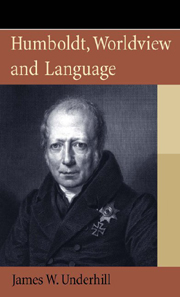Book contents
- Frontmatter
- Contents
- Acknowledgements
- Preface
- Part I Language and World
- Part II Humboldt, Man and Language
- 7 Worldview (Weltanschauung or Weltansicht)
- 8 Sprache
- 9 The Work of the Mind
- 10 Form
- 11 Creativity, Culture and Character
- 12 Catching the Character
- 13 A Seeing and Feeling Worldview
- 14 Four Dangers in the Comparative Approach
- 15 Reformulating the Worldview Hypothesis World
- 16 A Final Word
- Glossary
- Bibliography
- Index
9 - The Work of the Mind
from Part II - Humboldt, Man and Language
Published online by Cambridge University Press: 12 September 2012
- Frontmatter
- Contents
- Acknowledgements
- Preface
- Part I Language and World
- Part II Humboldt, Man and Language
- 7 Worldview (Weltanschauung or Weltansicht)
- 8 Sprache
- 9 The Work of the Mind
- 10 Form
- 11 Creativity, Culture and Character
- 12 Catching the Character
- 13 A Seeing and Feeling Worldview
- 14 Four Dangers in the Comparative Approach
- 15 Reformulating the Worldview Hypothesis World
- 16 A Final Word
- Glossary
- Bibliography
- Index
Summary
For Humboldt the division of a language into words and rules to be classified is a procedure that can be misleading. He believes this to be a scientific endeavour and it is one he engages in himself, but he is careful to delineate the boundaries of a scientific understanding of language when he says: ‘The break-up into words and rules is only a dead makeshift of scientific analysis’ (1999: 49). If this is so, it is because science can only ever analyse parts of language in isolation, abstracted from the context in which speech is uttered. This blinds science to what is most fundamental in language for Humboldt; the mind's creation of meaningful speech. In a similar way, a hundred years later, Whorf would stress that meaning is always at the heart of language and should consequently form the principle concern in the linguist's endeavour. For Humboldt, meaning arises in discourse from mental work, or what Heath calls a work of the spirit, in his translation of eine Arbeit des Geistes (Humboldt 1999: 49; 2003: 315).
Heath's translation echoes expressions made famous by the English philosopher John Locke (1632–1704); ‘the workmanship of the mind’ (1964: 279) and ‘the workmanship of understanding’ (281).
- Type
- Chapter
- Information
- Humboldt Worldview and Language , pp. 63 - 73Publisher: Edinburgh University PressPrint publication year: 2009

